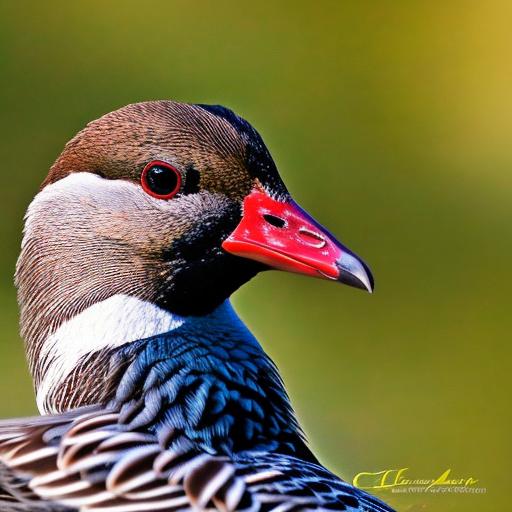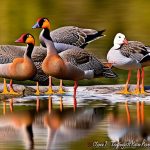Introduction:
Hello bird lovers! Today, we are going to discuss a common problem that many of you may have encountered – geese at bird feeders. While it may seem harmless to have these beautiful creatures visit your feeders, it can actually cause a number of issues. Geese can be aggressive towards other birds, consume large amounts of food, and leave behind a mess that is difficult to clean up. In this article, we will explore various methods to deter geese from your bird feeders and create a more peaceful and enjoyable feeding environment for all birds.
Understanding the behavior of geese at bird feeders:
Geese are attracted to bird feeders for a number of reasons. Firstly, they are social animals and are often drawn to areas where other birds are congregating. Additionally, geese are opportunistic feeders and will take advantage of any available food source. They are particularly attracted to open areas where they can easily spot potential threats or predators.
When geese arrive at bird feeders, they tend to dominate the feeding area. They are larger than most other birds and will aggressively defend their territory. This can lead to smaller birds being intimidated or even injured. Geese also have a voracious appetite and can consume large quantities of food in a short amount of time, leaving little for other birds.
Choosing the right bird feeder to deter geese:
To deter geese from your bird feeders, it is important to choose the right type of feeder. Geese are attracted to open feeding areas where they can easily access the food. Therefore, it is best to choose feeders that have smaller openings or are designed specifically for smaller birds.
Tube feeders with small perches or mesh feeders that only allow small birds to access the food are good options. These types of feeders make it difficult for geese to access the food and discourage them from visiting your feeders.
Utilizing physical barriers to keep geese away:
Another effective method to deter geese from your bird feeders is to use physical barriers. Fencing or netting can be installed around the feeding area to prevent geese from accessing the food. This can be particularly useful if you have a large open space where geese tend to congregate.
When installing a fence or netting, it is important to ensure that it is tall enough to prevent geese from flying over it. Additionally, the bottom of the fence or netting should be secured to the ground to prevent geese from crawling underneath. Regular maintenance of the barriers is also necessary to ensure their effectiveness.
Using decoys to scare off geese:
Decoys can be an effective way to scare off geese from your bird feeders. Fake predators, such as plastic owls or hawks, can be placed near the feeding area to create the illusion of danger. Geese are naturally wary of predators and will avoid areas where they perceive a threat.
Another option is to use decoy birds, such as plastic ducks or swans, to deter geese. Geese are territorial and will avoid areas where other birds are already present. By placing decoy birds near your feeders, you can create the impression that the area is already occupied and discourage geese from visiting.
Employing sound devices to repel geese:
Sound devices can be an effective way to repel geese from your bird feeders. Speakers or alarms that emit loud noises can startle geese and make them uncomfortable. This can be particularly useful if you have a large open space where other deterrent methods may not be as effective.
When using sound devices, it is important to vary the sounds and frequencies to prevent geese from becoming accustomed to them. Additionally, it is important to consider the impact on other birds and wildlife in the area. Sound devices should be used sparingly and only when necessary to avoid causing unnecessary stress or disturbance.
Using natural repellents to keep geese at bay:
Natural repellents can also be used to deter geese from your bird feeders. Citrus fruits, such as oranges or lemons, can be placed near the feeding area as geese are known to dislike the smell. Garlic or chili powder can also be sprinkled around the area to create an unpleasant scent for geese.
It is important to note that natural repellents may need to be reapplied regularly as their effectiveness can diminish over time. Additionally, it is important to consider the impact on other birds and wildlife in the area. Natural repellents should be used sparingly and only when necessary to avoid causing unnecessary harm or disruption.
Creating a geese-free zone around the bird feeder:
To create a geese-free zone around your bird feeder, it is important to make the area less attractive to geese. This can be achieved by removing any potential food sources, such as spilled seed or fallen fruit. Regularly cleaning the area around the feeder and removing any debris or waste can help discourage geese from visiting.
Additionally, creating physical barriers, such as shrubs or plants, can make it more difficult for geese to access the feeding area. Planting dense vegetation around the feeder can create a natural barrier that geese are less likely to venture through.
Consistently maintaining the bird feeder to discourage geese:
Regular maintenance of your bird feeder is essential to discourage geese from visiting. This includes cleaning the feeder regularly to remove any leftover food or debris that may attract geese. It is also important to regularly refill the feeder with fresh food to ensure that there is always enough for smaller birds.
Additionally, it is important to monitor the feeding area for any signs of geese or other unwanted visitors. If you notice geese frequenting your feeders, it may be necessary to adjust your deterrent methods or seek professional help to control the geese population.
Seeking professional help when necessary to control geese population:
In some cases, the geese population may become too large to manage on your own. If you are unable to effectively deter geese from your bird feeders or if the geese population is causing significant issues, it may be necessary to seek professional help.
Professional wildlife management companies can provide expert advice and assistance in controlling the geese population. They can assess the situation, develop a management plan, and implement appropriate measures to deter geese from your property.
In conclusion, having geese at bird feeders can be a nuisance and cause a number of issues. However, by understanding their behavior and implementing effective deterrent methods, you can create a more peaceful and enjoyable feeding environment for all birds. Whether it’s choosing the right feeder, utilizing physical barriers, using decoys or sound devices, or employing natural repellents, there are various methods available to deter geese from your bird feeders. Remember to consistently maintain your feeder and seek professional help when necessary to control the geese population. By taking action and implementing these strategies, you can create a geese-free zone and ensure that your bird feeders are a welcoming space for all birds. So go ahead and give it a try – your feathered friends will thank you!
Remember to share this article with others who may be dealing with the same problem. Together, we can create a community of bird lovers who are committed to creating a peaceful and enjoyable feeding environment for all birds. Happy bird watching!
If you’re tired of geese invading your bird feeder and causing a mess, you’ll want to check out this helpful article on Poultry Wizard. They provide valuable tips and tricks on how to keep geese away from your bird feeder. From using decoys and deterrents to creating physical barriers, this article offers practical solutions to ensure that your feathered friends can enjoy their meals undisturbed. For more information, visit https://poultrywizard.com/keeping-chickens/chicken-coop-door-size/.
FAQs
What are some common problems caused by geese at bird feeders?
Geese can cause a variety of problems at bird feeders, including eating all the birdseed, damaging the feeder, and leaving droppings that can be unsanitary and difficult to clean.
What are some effective ways to keep geese away from bird feeders?
Some effective ways to keep geese away from bird feeders include using physical barriers like fences or netting, using decoys or scare tactics like noise makers or reflective tape, and using bird feeders that are designed to be difficult for geese to access.
Are there any natural deterrents that can be used to keep geese away from bird feeders?
Yes, there are some natural deterrents that can be used to keep geese away from bird feeders. These include planting certain types of vegetation that geese do not like, using natural repellents like vinegar or garlic, and using predator urine or other animal scents to deter geese.
Is it safe to use chemical repellents to keep geese away from bird feeders?
While there are some chemical repellents that can be effective at keeping geese away from bird feeders, it is important to use them with caution. Many chemical repellents can be harmful to birds and other wildlife, as well as to humans and pets. It is best to use natural or physical deterrents whenever possible.
What should I do if geese continue to be a problem at my bird feeder?
If geese continue to be a problem at your bird feeder, it may be necessary to take more drastic measures, such as relocating the feeder or contacting a professional wildlife control service. It is important to remember that geese are protected by federal law, so it is illegal to harm or kill them without a permit.
Meet Walter, the feathered-friend fanatic of Florida! Nestled in the sunshine state, Walter struts through life with his feathered companions, clucking his way to happiness. With a coop that’s fancier than a five-star hotel, he’s the Don Juan of the chicken world. When he’s not teaching his hens to do the cha-cha, you’ll find him in a heated debate with his prized rooster, Sir Clucks-a-Lot. Walter’s poultry passion is no yolk; he’s the sunny-side-up guy you never knew you needed in your flock of friends!







